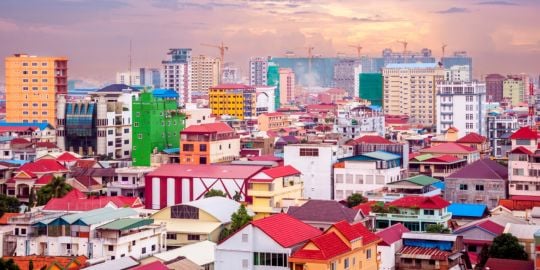Did you get a Hepatitis A vaccine before coming to Cambodia?
I was planning on it, until I just realized it is apparently 2 vaccines given over a 6 month period. I leave in 2 months 
Vaccines
Hi,
Yes. Vaccines are very important going to third world country. Specially when its not very clean. Can you ask your doctor, If he can give you the vaccine there and the follow up here. There is a vaccine here in Phnom Penh.
Hi am0425.
You will need both Herpatitis A and Herpatitis B.
Its true that you get the shots within a period of 6 month, but as far as i know the second injection you get is a revaccination to make it last for over 20+ years. Its called Twinrex here in Denmark.
There are other vaccinations that are a must when you travel to Cambodia, so ask your doctor. It might sound a Little expensive 150-300 usd to be on the safe side, but so is a lifetime of horrible illness.
If anyone forgot about vaccinations im pretty sure i read here on forum that the Pastuer Clinic in Phnom Phen offers vaccines.. But better get them before comming to Cambodia..
Not sure what you're all talking about. Always wary about putting chemicals in my body and never taken any vaccines ever. Is there some dire disease in Cambodia I didn't know about? Managed 20 years in 'third world' without getting sick. Eat well, stay fit and you will live to be 100!
You can count yourself Lucky  .. 20 years is a long time. A friend of mine was unlucky and caught a resistant strain of malaria after just a week in Malaysia. Spent 6 month in the hospital and are still taking meds.
.. 20 years is a long time. A friend of mine was unlucky and caught a resistant strain of malaria after just a week in Malaysia. Spent 6 month in the hospital and are still taking meds.
So better be safe Guys..
Here are some of the not so pleasant stuff you can catch. The reason why most get a vacination for these diseases are that there are no cure for any of them except Typhoid.
COPY PASTE FROM CDC (center for diseese control)
Hepatitis A
CDC recommends this vaccine because you can get hepatitis A through contaminated food or water in Cambodia, regardless of where you are eating or staying.
get_vaccinated eat_drink
Typhoid
You can get typhoid through contaminated food or water in Cambodia. CDC recommends this vaccine for most travelers, especially if you are staying with friends or relatives, visiting smaller cities or rural areas, or if you are an adventurous eater.
get_vaccinated eat_drink
Hepatitis B
You can get hepatitis B through sexual contact, contaminated needles, and blood products, so CDC recommends this vaccine if you might have sex with a new partner, get a tattoo or piercing, or have any medical procedures.
get_vaccinated avoid_body_fluids avoid-non-sterile-equipment
Japanese Encephalitis
You may need this vaccine if your trip will last more than a month, depending on where you are going in Cambodia and what time of year you are traveling. You should also consider this vaccine if you plan to visit rural areas in Cambodia or will be spending a lot of time outdoors, even for trips shorter than a month. Your doctor can help you decide if this vaccine is right for you based on your travel plans. See more in-depth information on Japanese encephalitis in Cambodia.
get_vaccinated avoid_insects
Malaria
When traveling in Cambodia, you should avoid mosquito bites to prevent malaria. You may need to take prescription medicine before, during, and after your trip to prevent malaria, depending on your travel plans, such as where you are going, when you are traveling, and if you are spending a lot of time outdoors or sleeping outside. Talk to your doctor about how you can prevent malaria while traveling.
Rabies
Rabies can be found in dogs, bats, and other mammals in Cambodia, so CDC recommends this vaccine for the following groups:
•Travelers involved in outdoor and other activities (such as camping, hiking, biking, adventure travel, and caving) that put them at risk for animal bites.
•People who will be working with or around animals (such as veterinarians, wildlife professionals, and researchers).
•People who are taking long trips or moving to Cambodia
•Children, because they tend to play with animals, might not report bites, and are more likely to have animal bites on their head and neck.
Jeez, do you work for a big pharmaceutical drug company? The suggestion that you should stuff your body full of chemicals just in case you catch something is rather scary. We all have an immune system that works perfectly well if boosted with a decent diet and healthy life-style. Don't forget that all the vaccines you recommend reduce your bodies ability to fight off foreign bodies that may or may not invade you as you travel.
At the risk of feeding a troll, I feel a need to jump in here.
Buddy, everything you ever put in your body is chemicals. Water is a chemical. It might be a big, scary-sounding word but it describes something perfectly mundane.
Vaccines do the exact opposite of "reduce your bodies [sic] ability to fight off foreign bodies". Vaccines work by giving the immune system to tools to fight specific pathogens. Things that can often do lasting, even fatal damage if you trust your body to fend for itself, no matter how balanced your diet is.
You have made the decision to eschew vaccines for yourself, which is fine (though I hope you don't come into contact with any immune-compromised people as you could really harm them), but trying to scare people off of proven, effective, life-saving healthcare is seriously wrong.
Also, "do you work for a big pharmaceutical drug company?" Anyone who disagrees must be paid to do so? Really? Really?
Having lived, worked and traveled around the world I would advocate getting the vaccinations. I know first hand what it is to be ill in places that have no access to medical facilities and if it was not for the vaccinations I would be dead.
I have had malaria, bilharzia, typhoid, amoebic dysentery to name a few. Last major illness was a dose of malaria and typhoid together. Kidneys shut down and when I did get to a hospital the doctor told me I was 36 hours off dying and if I had not got the vaccinations I would have been dead before I got to the hospital.
Vaccinations are a personal choice but that choice should be an informed one based on information regarding the countries one wishes to travel in. Better to be safe than sorry.









